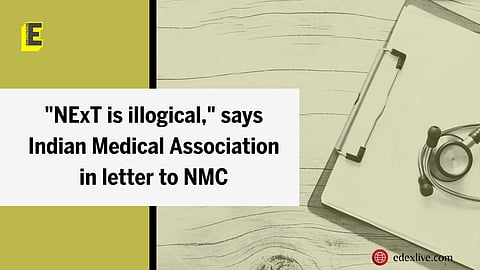

The Indian Medical Association (IMA) has urged the National Medical Commission (NMC) to reconsider introducing the National Exit Test (NExT), which might soon replace the Postgraduate National Eligibility cum Entrance Test (NEET-PG) for admission into postgraduate medical courses in India.
The letter addressed to Chairman of NMC, Dr BN Gangadhar, expresses its reservation against the NExT exam as they deem that this might jeopardise the realm of medical education in the country.
The association states various reasons in its letter to NMC:
1) NExT defeats the vision of the government to provide affordable and accessible medical education, as it may hamper the chances of students from underprivileged communities.
2) NExT is a time-tested method, and its introduction while emulating Western methods will not be in the best interest of the country.
3) NExT, which is in line with the concept of one test, would not be favourable, as uniform standards of medical education do not exist across all academic institutions.
4) NExT comes across as "completely illogical", as it cannot be conducted both as a licentiate exam and a PG entrance exam. IMA states that while the focus of a licensing exam should be on assessing the minimum standard, a PG exam should be on selecting meritorious students.
5) NExT, which is going to be a Multiple Choice Question (MCQ) based test, will lead to a decline in attention spans and interest of students in classes, leading to mushrooming of coaching centres, which might hamper the academic and clinical skills of the students, thereby, affecting the medical system of the country.
Serious deliberations required
The IMA exhorts for extensive discussions on matters that need serious consideration such as the establishment of passing criteria, the initiation of comprehensive stakeholder consultations, the adoption of an assessment methodology, and clarification of any newly introduced norm to students in regard to an exam.
The letter further states, "It may be noted that 349 colleges were given notice for faculty deficiencies in 2023-24 and 40 medical colleges were derecognised in the last 2 months. Limited access to resources may hinder the equal distribution and adoption of NExT across all medical colleges."
The NMC, on January 25, had asked stakeholders for suggestions on the implementation and execution of NExT by February 7.
